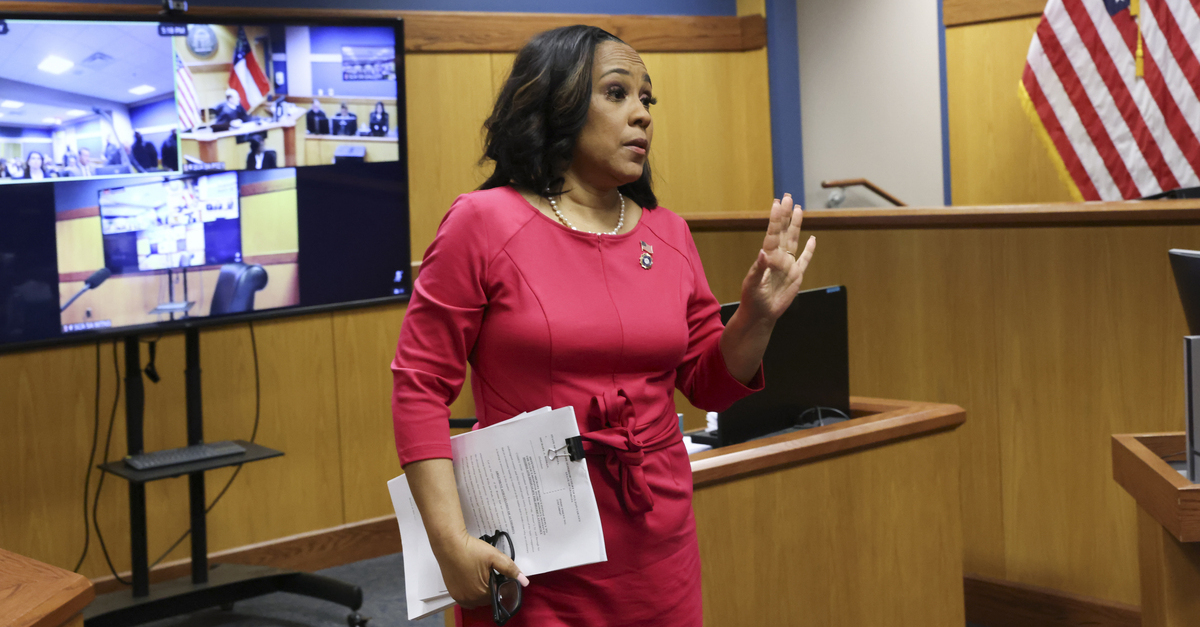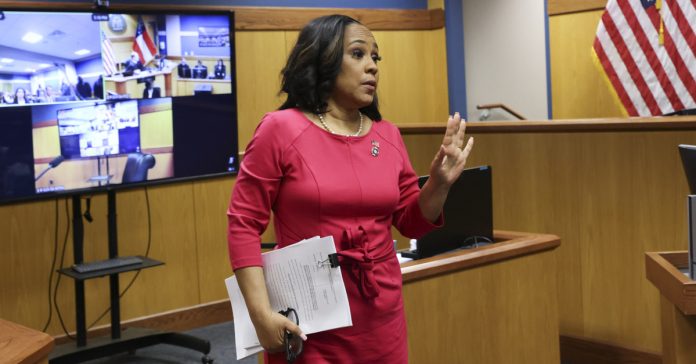
Fulton County District Attorney Fani Willis steps away from the stand after testifying during a hearing on the Georgia election interference case, Thursday, Feb. 15, 2024, in Atlanta. (Alyssa Pointer/Pool Photo via AP)
Expectations were dashed for a second day of hard-charging testimony as the state abruptly decided not to call Fulton County District Attorney Fani Willis back to the stand in the continued hearing over allegations that she and special prosecutor Nathan Wade had an untoward and nepotistic relationship. Prosecutors had signaled at the end of Thursday’s hearing that they had a lengthy cross-examination planned for their boss — but appear to have decided against doing so.
On Thursday, Willis was the last of four witnesses called by defense attorney Ashleigh Merchant, who represents co-defendant Michael Roman, a former staffer for Donald Trump’s 2020 election campaign.
The decision by the state to keep the district attorney off the stand again, however, means the defense will not get another chance to conduct redirect examination of their witness. Willis had long resisted testifying — and filed a motion to quash her subpoena that was withdrawn in dramatic fashion before she took the stand.
Friday’s proceedings were quickly paused by Fulton County Superior Court Judge Scott McAfee in order for the defense’s next witness, Georgia attorney Terrence Bradley, to get finished with a doctor’s appointment and make it back to the courthouse.
In the meantime, the various parties were instructed to mull over a collection of documents likely to be relevant to the remainder of the testimony in the hearing that could determine the fate of the racketeering (RICO) and election subversion case going forward.
The prior day’s testimony was a mixed bag — but with one marked procedural victory for the defense as Willis’s onetime friend and district attorney’s office colleague, Robin Yeartie, took the stand.
On Thursday, Yeartie testified Willis and Wade began their romance in late 2019 — directly disputing prior court filings in which both Willis and Wade claimed it began in 2022. The two prosecutors stood by that timeline when they took the stand — resulting in three under-oath statements saying two different things entirely.
Yeartie was supposed to be first witness called but went second due to a small scheduling snafu. Her testimony was what convinced McAfee to enforce the defense subpoena on Wade himself.
Early on, Wade attempted to add caveats to dueling answers he gave in response to two different interrogatories about extramarital affairs.
In the first court filing, Wade said he had not had sexual relationships with anyone outside of marriage up to May 30, 2023. In the second and later court filing, Wade admitted to a relationship with someone other than his wife.
To try and bridge that admitted divide, Wade said, he considered his marriage “irretrievably broken” as of some time in 2015 — Wade and his estranged wife, however, remain legally married, although divorce proceedings are underway.
“I was free to have a relationship,” Wade added.
Bradley was actually the first witness called in the eventual knock-down, drag-out hearing, but his testimony was essentially a procedural nonstarter — with almost every question leveled by the defense objected to on grounds of attorney-client privilege by the state. Often, Bradley’s own attorney echoed those objections.
When Bradley does take the stand again, he will presumably be asked, in essence, whether Willis and Wade lied about the timeline of their relationship.
Of the admitted relationship between Willis and Wade, McAfee has previously ruled: “I think it’s possible that the facts alleged by the defendant could result in disqualification.”
Have a tip we should know? [email protected]

